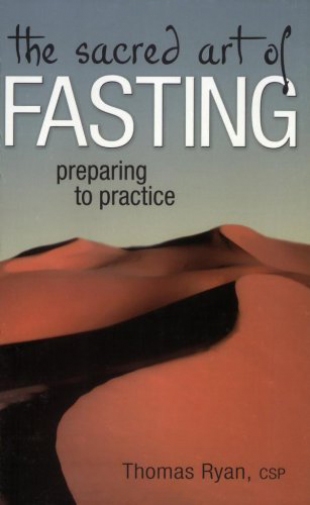This is the third in a series of paperbacks in the Skylight Paths series "Preparing to Practice" following The Sacred Art of Bowing by Andi Young and The Sacred Art of Chant by Ana Hernandez. Author Thomas Ryan is a Catholic priest and as a member of the Paulist Fathers coordinates the order's ecumenical and interreligious relations in the United States and Canada. He points out that nowadays many people are seeing the value of fasting as a kind of body-ecology, a sane and salutary way of taking care of ourselves. Health care workers and others advocate fasting to calm us down, help us think more clearly, sleep better, clean out the body, and give the whole system a rest. But the world's religious traditions also have a wealth of insights on this practice. Fasting is a choice to abstain from food and drink at certain times in order to draw closer to God, to care for our enspirited bodies, and to connect with those who are less fortunate than we are.
Ryan does a commendable job laying out how the religions use fasting and mine its many meanings. In Judaism, it is seen as a devotional path to purification, mourning, and atonement; in Christianity, it leads to mystical longing, liberation through discipline, and the work of justice; in Islam, it encourages Allah-consciousness, self-restraint, and social solidarity; in Hinduism, it involves purity, respect, and penance; in Buddhism, its aim is purity of body, clarity of mind, and moderation; and among Latter-Day Saints, its purpose encompasses offerings for those in want and strengthening the faith. Ryan, who fasts once a week, hopes that Christians will be able to bring back this valuable spiritual practice. He makes a good case for linking it with hunger and other social issues.
Ryan wants people to know that fasting is not just for particular periods of religious observance, such as Lent and Ramadan, but instead can be a valuable part of everyday life. He ends the book with creative suggestions for fasts for your eyes, ears; from judging others, anger, resentment and bitterness; and more (see excerpt). He sums things up this way:
"Fasting as a religious act increases our sensitivity to that mystery always and everywhere present to us. It is a passageway into the world of spirit to explore its territory and bring back a wisdom necessary for living a fulfilled life. It is an invitation to awareness, a call to compassion for the needy, a cry of distress, and a song of joy. It is a discipline of self-restraint, a ritual of purification, and a sanctuary for offerings of atonement. It is a wellspring for the spiritually dry, a compass for the spiritually lost, and inner nourishment for the spiritually hungry."
